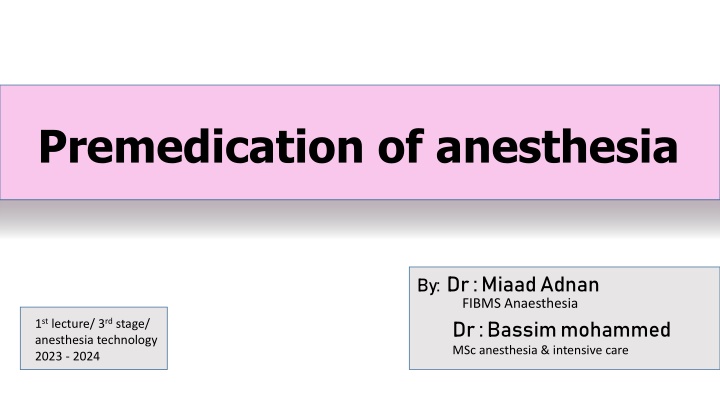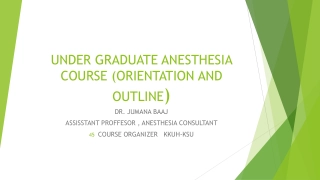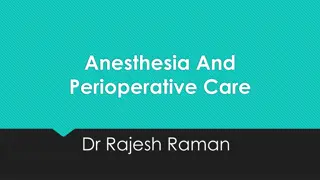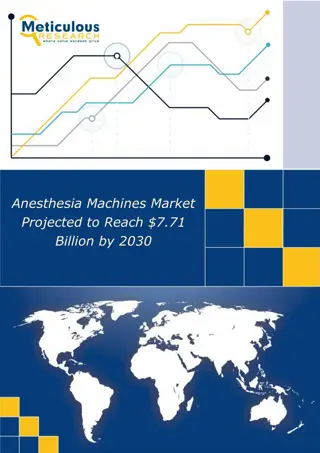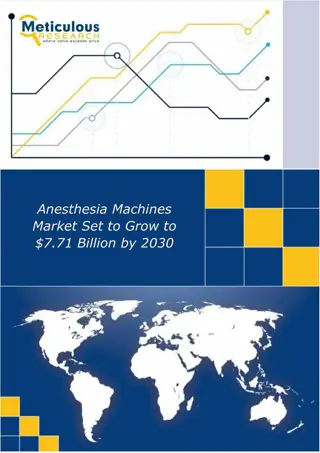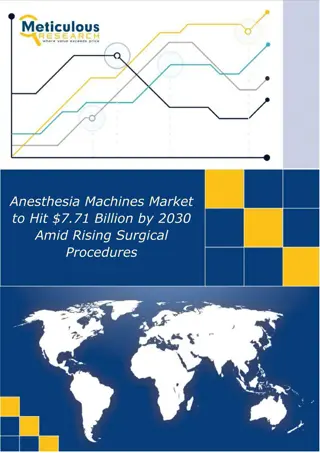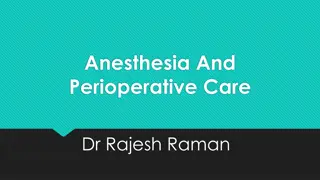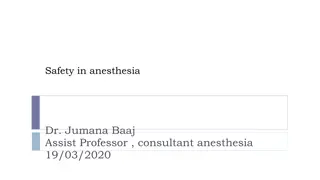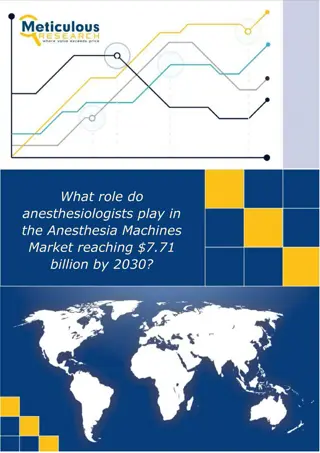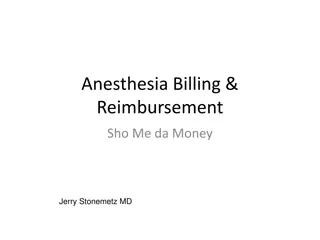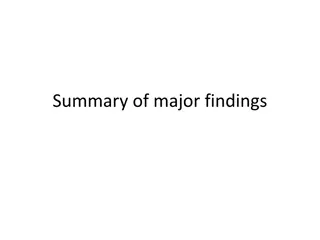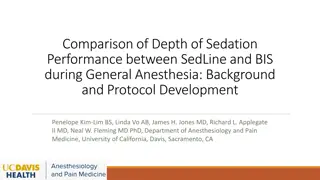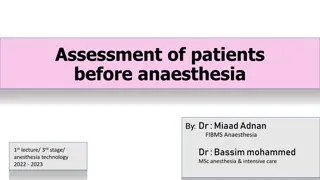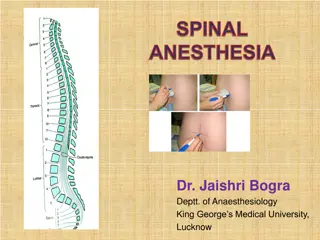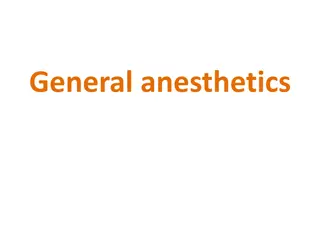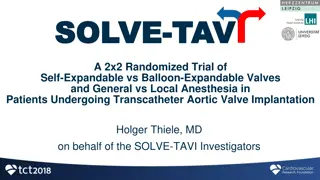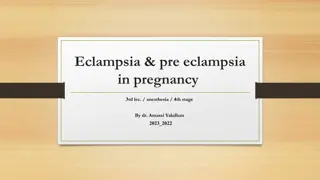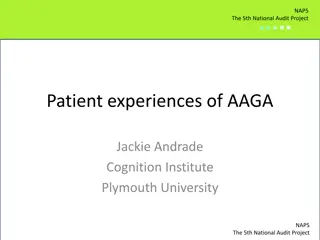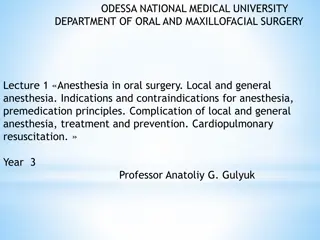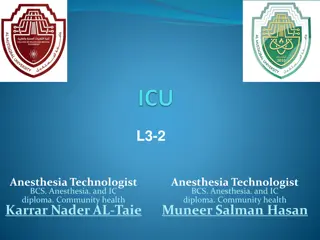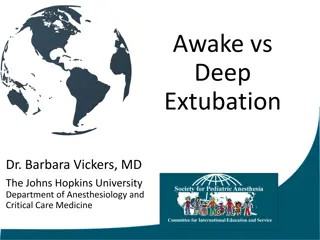Premedication of anesthesia
Premedication in anesthesia involves administering drugs before induction to achieve goals such as anxiety relief, sedation, amnesia, and antiemetic effects. Psychological and pharmacological components play a crucial role in premedication, ensuring the patient enters the operation room in an optimal state. Common drugs like benzodiazepines and anti-emetics are used to provide anxiolysis and prevent complications during anesthesia induction. Understanding the goals and techniques of premedication is essential for successful anesthesia management.
Download Presentation

Please find below an Image/Link to download the presentation.
The content on the website is provided AS IS for your information and personal use only. It may not be sold, licensed, or shared on other websites without obtaining consent from the author.If you encounter any issues during the download, it is possible that the publisher has removed the file from their server.
You are allowed to download the files provided on this website for personal or commercial use, subject to the condition that they are used lawfully. All files are the property of their respective owners.
The content on the website is provided AS IS for your information and personal use only. It may not be sold, licensed, or shared on other websites without obtaining consent from the author.
E N D
Presentation Transcript
Premedication of anesthesia By: Dr : Miaad Adnan FIBMS Anaesthesia Dr : Bassim mohammed MSc anesthesia & intensive care 1st lecture/ 3rd stage/ anesthesia technology 2023 - 2024
1 Premedication : Definition : Administration of drugs before induction of anaesthesia Components : Psychological Pharmacological
2 Premedication : Psychological Premedication is provided by the anesthesiologist's preoperative visit and interview with the patient and family members. Pharmacological Premedication is administration of drugs orally orintramuscularly 1 to 2 hours before the anticipated induction of anesthesia
3 Goals of Premedication ? Anxiety relief (anxiolysis ) Amnesia Sedation Analgesia Antiemtic Antisalogogoue effect Increased in gastric fluid PH
4 Goal of Premedication ? Decreased in gastric fluid volume Attenuation of sympathetic nervous system Reflex response Decrease in anesthetic requirements Prophylaxis against allergic reaction
5 Goal of Premedication ? The patient should enter the operation room: Free of apprehension Sedated Arousable Cooperative
6 Premedication : Anxiolysis benzodiazepines B-blockers Amnesia lorazepam anterograde amnesia
7 Anxiolytic These drugs used to decrease the anxiety of the patients and makehimsedative and calm with amnesia (unable to remember) They act predominantly on GABA receptors Minimum cardiac and respiratory depression Do not produce nausea and vomiting Lack the analgesic effect Cross the placenta and may cause neonatal depression The main drugs that used are the benzodiazepines ; diazepam , midazolam , lorazepam ,alprazolam.
8 Premedication : Anti-emetic - Dopamine antagonists - Antihistamines - Anticholinergics - 5-hydroxytryptamine antagonists - A2- agonists: clonidine, Dexmetomidine
9 Premedication : Antiemetic : Metoclopramide (plasil) : The most common used antiemetic drug Dose 0.15 to 0.3 mg /kg and last for 12 hour Used in emergency anesthesia Act centrally as dopaminergic antagonist on the vomiting center in the medulla Act peripherally by increasing the rate of gastric emptying and increasing in the gut peristalsis May produce oculogyric (extrapyramidal) side effect
10 Premedication : Antacid Patients who have received opiates present as emergencies If in pain delayed gastric emptying hiatus hernia Oral sodium citrate Ranitidine , Proton pump inhibitors Metoclopramide naso- or orogastric tube
11 Premedication : Anti-autonomic use in : Parasympathetic reflexes Excessive vagal activity causing profound bradycardia Halothane Suxamethonium Surgery Traction on the extraocular muscles Handling of the viscera During elevation of a fractured zygoma
12 Premedication : Typical Adult Dose (mg) Classification Drugs Route
14 Premedication : Reduce or withhold sedatives and analgesics in - elderly - debilitated patients (severely ill patient) - acutely intoxication - upper airway obstruction - trauma - central apnea - neurologic deterioration - severe pulmonary and valvular heart diseases
15 Premedication : Fentanyl : Potent analgesic 100 times more than morphine Metabolized in the liver and excreted in the urine Produce respiratory depression so use in caution with COPD Cause less nausea and vomiting Can be reversed by naloxone Dose 1-5 microgram / kilogram i.v
16 Premedication : Anti-autonomic: has vagal inhibition (tachycardia), CNS stimulation , Antisialagogues Atropine : (decrease salivation) . The dose of atropine is 0.3 0.4 mg iv Hyoscine : had less vagal inhibition effect with more effect onsalivation but produce sedation and amnesia so should be avoidedin elderly
17 Premedication : Anti-autonomic : Glycopyrrolate : Has no central action, because it does not crosstheblood brain barrier. Had longer duration and less tachycardia They produce dry mouth They produce mydriasis (dilation of eye pupil ) Atropine may cause central anticholinergic syndrome (restlessness, agitation, somnolence, convulsion ) and this can be reversed by physostigmine
18 Premedication : Chronic drug used by patients: antihypertensives except ARBs & ACE inhibitors (stop 24-36 hrs. preoperatively) Diuretics cardiac medications (beta blockers.digoxin, calcium channel blockers) Antidepressants Anxiolytics
20 Premedication : Chronic drug used by patients: Thyroid medications Steroids & Statins psychiatric medications, birth control pills, eye drops heart burn & reflux medications asthma medications
21 Premedication : Medicines with special attention : Aspirin: reversal of platelet inhibition within 3 days of stopping don't stop in patients with : - drug eluting coronary stents until 12months of dual antiplatelet therapy completed - bare metal stents :continue for 1 month Thienopyridines(clopidogrel (Plavix),ticlopidine) reversal of platelet inhibition in 7 days for clopidogrel ,14 days for Ticlopidine for cataract sx:no need to stop for coronary artery stents,same as aspirin
22 Premedication : Medicines with special attention : Oral hypoglycemics: discontinue on day of sx Diuretics: discontinue on day of sx except thiazides taken as antihypertensive sildenafil: discontinue 24hrs before sx COX 2 inhibitors: continue on day of sx unless surgeon is concerned about bone healing NSAIDs: discontinue 48hrs before day of Sx Warfarin: discontinue 4days before day of sx Mono amine oxidase inhibitors: continue medication and adjust anaesthesia plan accordingly.
